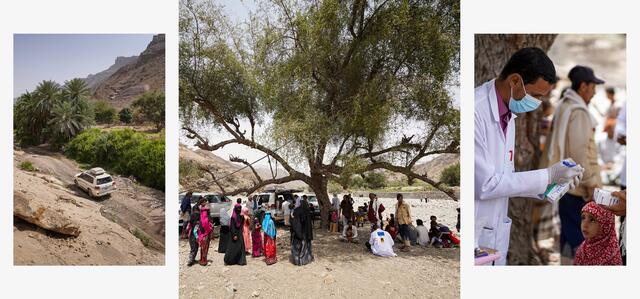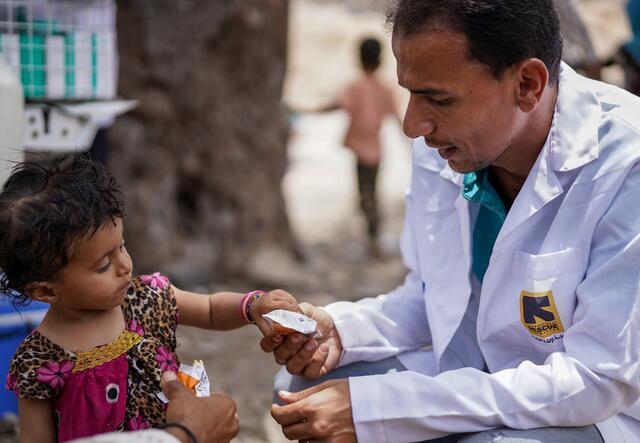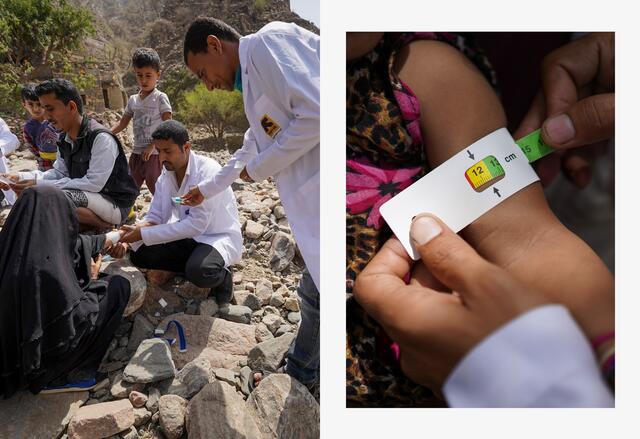A day in the life of a mobile health clinic doctor in Yemen
In Yemen, which has entered its eighth year of war, the International Rescue Committee delivers lifesaving health care through mobile health clinics.
In Yemen, which has entered its eighth year of war, the International Rescue Committee delivers lifesaving health care through mobile health clinics.
Meet Dr. Mohsen Fadel. Dr. Mohsen is a general practitioner who leads the IRC mobile health team in Lahj, a city in the south of Yemen. Every day, he and his team travel through rugged, mountainous landscapes to deliver health care and nutrition support to people living in the most remote villages in southern Yemen. Join Dr. Mohsen and his team on a typical day.
It’s 7am, and Dr. Mohsen (shown below) and his team of medical specialists—which includes a vaccination officer, pharmacist, nutritionist, midwife, and community health supervisor—are gearing up for another day of intense work. They will drive three hours to the rural Al-Namirah area, traversing dangerous, rocky terrain to reach families who would otherwise have no access to medical services.
Before they leave, they ensure the van is fully stocked with medicines, nutrition packs, vaccines, and other medical supplies—items that will allow the team to provide a range of essential health services. “We call it the ‘car of hope,’” Dr. Mohsen says, describing the mobile health van. “We pass through difficult geographical areas and valleys full of rocks, bringing all these items with us.”
During the van ride, Dr. Mohsen plays songs from a classic Yemeni singer, while the rest of the team hums along. It’s clear how close the team is—they laugh, joke, and share lunch together during their breaks—despite the difficult nature of their work and having to travel for hours back and forth to deliver lifesaving health care.
Dr. Mohsen is no stranger to the struggles of Yemenis living in remote villages. He himself comes from a rural area, so he has a deep-seated understanding of their needs.

“I am like them,” he says while on the drive to Namra (above), a remote community in the mountainous region of Lahj. “I’ve experienced their suffering. I come from a remote rural area that lacks basic health services. No health centres exist there, and people’s financial conditions prevent them from traveling to the nearest areas where they can get health services.”
In Yemen, more than 20 million people are in need of humanitarian assistance. The ongoing conflict has destroyed the economy and caused widespread food insecurity, while putting the public health system at the brink of collapse. The COVID-19 pandemic has only increased pressure on the limited health services available and compounded the economic crisis, pushing Yemenis deeper into need.
With less than half of health facilities functioning, IRC mobile health teams are a lifeline for Yemeni children and their families. Over 2.2 million children under five are malnourished and in need of nutrition support and treatment. In their weakened states, they are also more vulnerable to diseases like cholera and COVID-19.

Dr. Mohsen and his team regularly screen and treat children for malnutrition and other illnesses. They use MUAC tape, which measures the mid-upper arm circumference of children to identify levels of malnutrition. As part of their treatment plan, they distribute Plumpy’nut, a nutritious, peanut-based paste, which helps restore the health of malnourished children.
With the scarcity of reproductive health services in Yemen, IRC mobile health teams train midwives and community health workers to ensure safe deliveries and provide reliable care for mothers and their babies. During this trip, IRC vaccination officer Mushir Qassem makes sure that the babies they see are receiving the vaccines they need.
Dr. Mohsen and his team also provide check-ups to people with various health conditions. One patient they meet has a chest infection, while another is suffering from hypertension.

Due to the protracted conflict, many people with underlying health conditions have lost access to the medicines and treatment they need. Left unchecked, manageable diseases like hypertension and diabetes can become debilitating. Dr. Mohsen and his team help people manage their long-term health conditions by dispensing medication and monitoring their health through regular visits.
Despite all the challenges they face, Dr. Mohsen and the mobile health team have an unwavering commitment to their work. Explaining why his determination never falters, Dr. Mohsen says, “I’m happy to serve all these people, because I know how valuable the services we provide to them are—that’s why I’m actively doing my work with happiness to this day.”
All photos by Saleh Hayyan for the IRC
Thanks to the sustained support of our donors, the IRC has been working in Yemen since 2012 and rapidly scaled up our programming in 2015 to address greater humanitarian needs caused by the conflict. While the ongoing conflict creates challenges for our operations, the IRC has maintained access to affected populations and continues to provide lifesaving services, including treatment for malnutrition, health care, water and sanitation, cash assistance, women’s protection and empowerment, and education programming.